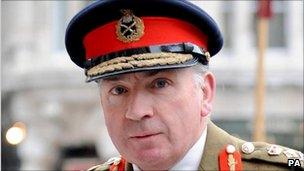Ex-army chief Dannatt reveals he quit Tory adviser role
- Published

Sir Richard said the government should receive advice from chiefs of staff, not a "has-been"
A former army chief who sparked a row when he acted as defence adviser to the Conservatives has revealed he quit the role when David Cameron became PM.
General Sir Richard Dannatt was accused of a "terrifying misjudgement" after he took the role months after retiring as one of the UK's top military officers.
It had been suggested he would be made defence minister in a Tory government.
Sir Richard said he had given up the post to ensure military advice came from chiefs of staff, not a "has-been".
He told Sky News: "I've retired from that. My motivation always was to act in the best interests of the defence of the realm, the safety of our citizens and the well-being of the armed forces so I was quite content as a public servant to give whatever advice his team wanted while they were preparing for government.
'Major error'
"But I said to David Cameron before the election that should he become prime minister then his proper military advice should come from the chiefs of staff and not from a has-been like me."
Sir Richard's appointment to the advisory role was revealed during the Tories' autumn conference last year.
The former chief of general staff had been a vocal critic of Labour's handling of the war in Afghanistan, prompting suggestions he would be awarded a peerage by the Tories should they win the 6 May general election.
The former head of the civil service, Lord Turnbull, described the appointment as "a major error of judgement", while former Liberal Democrat leader Lord Ashdown described it as a "terrifying misjudgement" which had compromised the independence of the military.
At the time, Sir Richard said he had only taken the role after standing down as army chief.
'Comprehensive discussion'
During the same Sky News interview on Sunday, Sir Richard said the renewal of the Trident nuclear deterrent must be considered in the current strategic defence review, which is expected to conclude in the autumn.
The government has said the Ministry of Defence (MoD), rather than the Treasury, will be expected to meet the £20bn cost of replacing the nuclear submarines.
But the project is currently excluded from the review of the UK's defence requirements.
Sir Richard said: "I think this strategic defence review has to ask itself two really key questions right at the start: what is the character and nature of future conflict, and what are the threats to the security of this country."
Trident was being sidelined from the debate, but "if we are going to have a comprehensive discussion of what the threats to this country are, I think the nuclear deterrent has to be weighed into that", he said.
"It is effectively being put on the table for discussion by asking the MoD to pay for it."
Sir Richard warned that he expected a scaling back of some military commitments following the review.
"I find it very hard to see - the maths just won't work out - how we can have a defence programme that looks remotely like our current programme, if we're going to bring it firstly bring it back into balance and deal with the overspend from the last government, and take five or 10% out of the current programme, and do the nuclear replacement submarines as well.
"It just will not stack up, and there's big things are going to have to go".
The MoD responded by saying the government was already carrying out a review into the renewal of Trident to ensure it provides value for money and this would "be conducted within the framework of the Strategic Defence and Security Review".